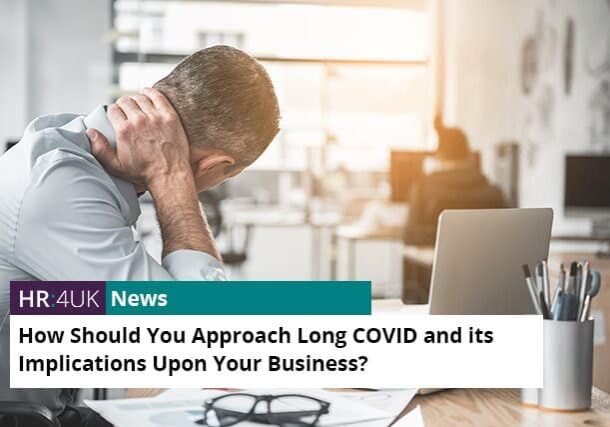How Should You Approach Long COVID?

With the impacts of Long COVID still to be fully understood, how should you approach the implications it can have upon your business?
While most who have suffered from the Covid illness have seen symptoms quickly pass, others have felt its symptoms lasting weeks or months after the illness has gone. But as an employer, for you, it always comes back to those questions. How do you handle the impact of Long COVID in your workplace and what does it mean for your employees who are suffering from this?
What is Long COVID?
The National Institute for Health and Care Excellence (NICE) defines ‘Long COVID’ as lasting for more than 12 weeks, and could affect someone’s ability to work or cause them to take prolonged sickness absences.
It’s important to note that there is no test for Long COVID, but symptoms, which are representative of the virus itself, can vary in severity and can include:
- Chest Pain
- Palpitations
- Breathlessness
- Confusion
It is also reassuring to know that people suffering from Long COVID are not infectious or contagious, and being diagnosed with this does not necessarily mean there has been a positive COVID-19 test.
Illnesses like Cancer and HIV have had their impact on the human body studied in great detail. Long COVID however has only been around for just over a year, so the quality of the data on the long term implications is not there yet. Therefore, as an employer, while this can present difficulties in supporting your worker, it could equally create frustrations for yourself as you try to understand what your duty of care is to whoever is suffering from the illness.
What are the implications in the workplace?
Whilst the symptoms, as we have discussed, can be classed as substantial, the fact that COVID-19 has been around for just over a year means we don’t yet know whether it will have a long-term impact on those suffering from it. As an employer, this means that right now, any staff member suffering from Long COVID cannot be classed as having a disability under the Equality Act 2010.
Our advisors suggest that if someone is suffering from Long COVID, it should be handled differently than a traditional sickness, with additional steps being considered and applied to those suffering from it.
Due to the uncertainty of whether it may be classed as a disability in the future, we would advise that employers consider all reasonable adjustments to support the employee (as you would with an employee who has a disability) before proceeding down the capability route.
An interesting perspective that you’ll want to be aware of is, that once your employee’s self-isolation period for COVID-19 is over, they are legally permitted to return to work. If they suffer from Long COVID symptoms, there is no legal need for them to self-isolate again.
The important thing to remember is that no two people will have the same symptoms. As such, you need to make sure that you do not take a blanket approach to handling employees who are confirmed to have Long COVID. This means discussing with each employee to identify how it affects them and then deciding on the support needed to ensure they can continue working in a healthy and safe environment.
What are HR:4UK’s Top Tips on managing Long COVID in the workplace?
The Equality Act 2010 places a positive obligation on an employer to consider what, if any, adjustments can reasonably be made to alleviate any disadvantage suffered by disabled individuals in the workplace.
Speaking to our advisors, they’ve shared the top tips that they would give to anyone who contacts them with a Long COVID related query:
- Think of ‘Long COVID’ in any staff member who experiences relevant symptoms: Anyone who is having a prolonged recovery (12+ weeks) after either confirmed or suspected COVID-19, whether they were admitted to hospital or managed in the community.
- Keep up to date with the NHS advice: Current guidance is that if your employee believes they have Long COVID, they do not need to isolate. However, it is recommended that since they share many similar symptoms, they get a full test for COVID-19.
- Make sure you have a return to work process in place: Talk to employees, have a return to work conversation, discuss and agree with them any workplace adjustments that they may need. It is also important to monitor and review these to ensure they are provided with the appropriate support. This could include allowing a phased return to work (including those experiencing Long COVID symptoms) allowing continued homeworking and providing access to occupational health and employee assistance programmes. We would also recommend that this process should all be documented.
- Proactively manage absence: Explore the reasons for any absences and, where there is a pattern of intermittent sickness absence or long-term sickness absences, refer employees to occupational health to gain a better understanding of the prognosis. We would recommend that you document any detrimental impact upon the business caused by the absence.
How can HR:4UK help you?
As we continue to work our way through the roadmap out of COVID-19 restrictions, we all continue to face uncertainty. HR:4UK will always be here waiting to help you, doing everything we can to advise and support you, ensuring you avoid any risky and costly mistakes. Speak to us today on 01455 444222 or email [email protected]
Angela Clay
A qualified employment law solicitor and our managing director, Angela has unparalleled legal expertise and decades of experience and knowledge to draw from. She’s a passionate speaker and writer that loves to keep employers updated with upcoming changes to legislation, and is a regular guest speaker on BBC Leicester Radio.




